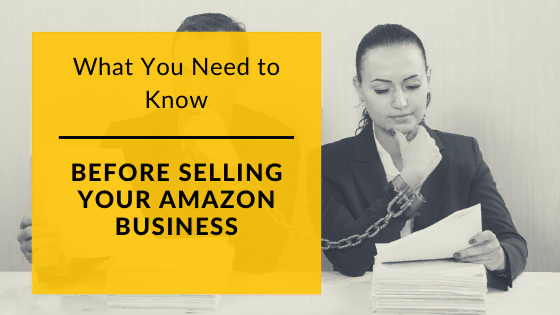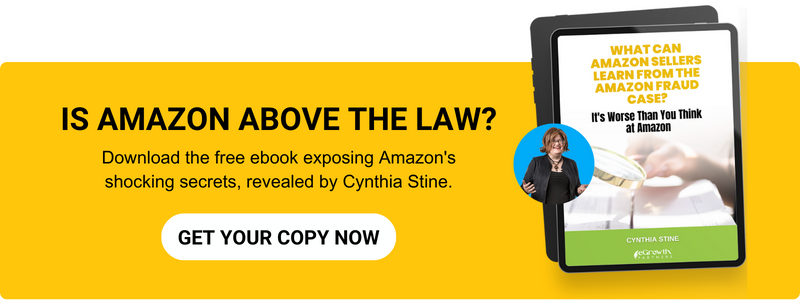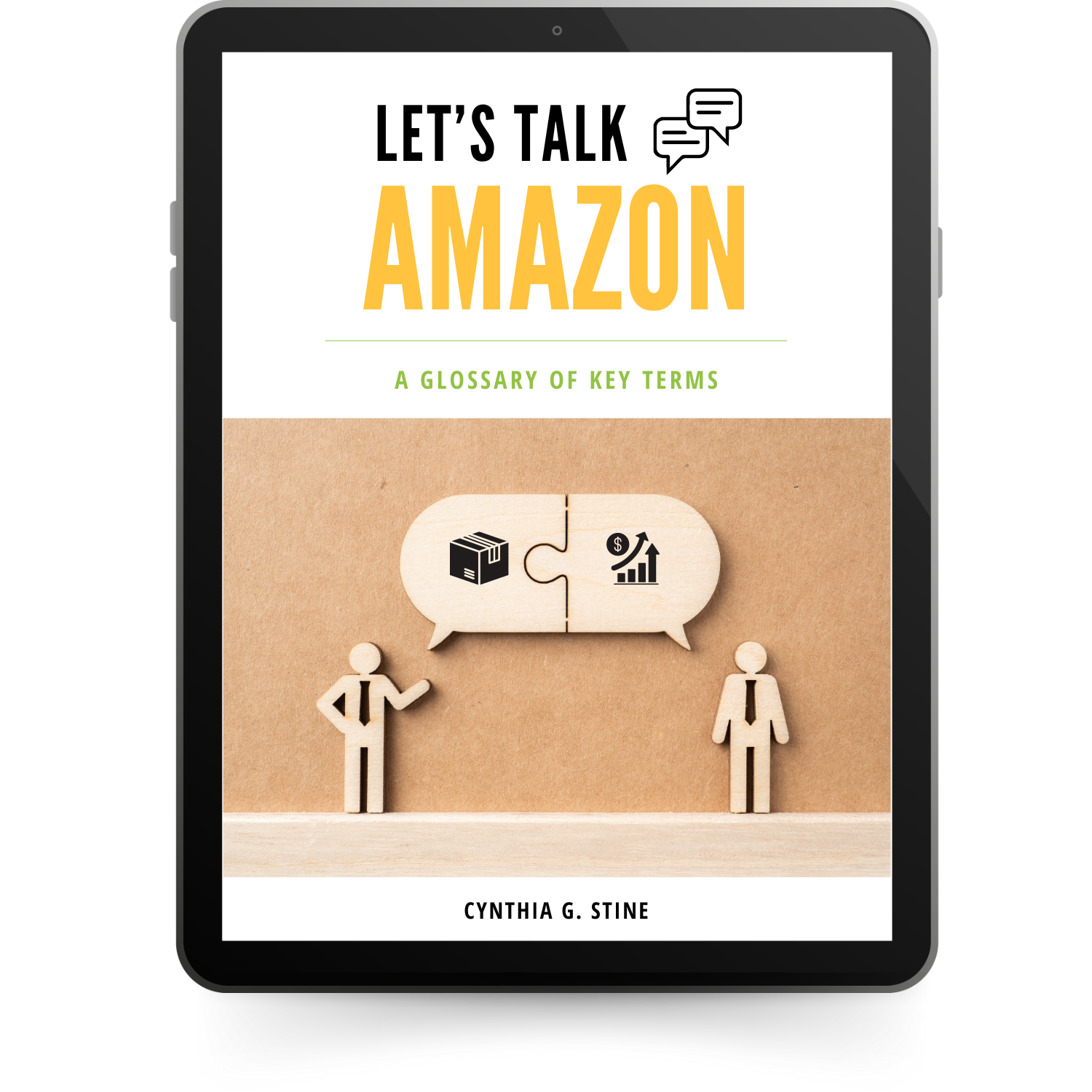The marketplace for businesses with Amazon accounts is brisk which is causing problems for buyers and sellers if the transaction isn’t handled properly. There are good business brokers I recommend for when you want to buy or sell a business, but what many of them lack is a clear understanding of Amazon’s policies around business transactions. I see situations regularly where the deal wasn’t done according to Amazon’s rules and then the buyer and the seller suffered later. Today I’m going to talk about what Amazon wants so you can discuss the best approach with your transaction advisor whether you are the buyer or seller.
The Basics
You need to understand Amazon’s policies thoroughly before you put your business up for sale or start to buy another company with an Amazon seller account.
Can I sell my Amazon business?
Yes and no. You can sell your business, of course, but you cannot sell an Amazon seller account. It’s in our contract with Amazon under “#18 Miscellaneous” and “P-4 Verification” where we are required to inform Amazon promptly of any change to our seller account. Also, under our Conditions of Use, “License and Access,” Amazon specifically states that we cannot sell or transfer any service they provide us (our seller account is a service). Lastly, under Seller Policies, “Can I transfer my seller account?”
Why can’t I sell my Amazon account? It’s part of the value of my company!
Amazon says a seller may only have one seller account in their lifetime and it belongs to Amazon. It is stated in our contract that an Amazon seller account cannot be sold or transferred. You are required to notify Amazon of any change to your business. See the above links.
What will Amazon do if I inform them?
They will help you close your account and will open a new account for the new owners. This takes a few months – for you – because of returns. You will be able to add the new owners to brand registry (assuming they are also buying your intellectual property). They can help your inventory be assigned to the new owners without needing to come back from the warehouse (assumes you are an FBA seller). They will sever all ties between you and the new owners in their system. OK, not really. They’ll make account annotations. Nothing is deleted on Amazon.
Know more: How To Enforce Your IP Rights With Amazon Brand Registry
What are the benefits to this approach?
You are doing things the Amazon way. You are open to start another business on Amazon (lots of caveats – see the Devil in the Details below) and you are not responsible for any mistakes the new owners make. This can be HUGE as some of my clients have found out the hard way.
What are the disadvantages to the Amazon way?
The new owners are starting as “just launched” sellers and lose all the seller feedback you’ve earned over the years. They must get approved for restricted categories and brands themselves. They lose anonymity with Amazon. They must be verified.
What about 1P sellers?
Companies who sell direct to Amazon have a contractual relationship with Amazon. Unlike 3P sellers who all sign the same contract, yours was likely customized. You need to read your contract carefully to understand if you can transfer this contract to a new owner or not and what notifications Amazon requires of you. It is likely they will want to vet the new owners. They may want the new owners to sign a new contract with them. It depends on your agreement.
The Devil in the Details
There are a lot of case-specific details and caveats about complying with Amazon’s policies around business transactions. For issues regarding your own situation, please contact us for a consultation. My advice here is general and does not apply to all situations.
What kind of proof do I need to provide Amazon about the change in ownership?
If you are transferring intellectual property, update the USPTO database and provide a screenshot to Amazon’s Brand Registry team when you add the new owners. Amazon may wish to verify it with the lawyer of record on the USPTO database.
Show Brand Registry and Seller Support a proof of sale document. Be sure there is an effective date of ownership. In other words, at what exact day and time do they own the inventory in your account? When should the new sales be going to them? This is sometimes different from the transaction date which is why I mention it specifically. You might close on a Friday, for example, and then transfer the inventory a week later. This gives you some time to notify Amazon and for the new owners to get their seller account set up. Since the new owners will have their own account, you don’t need to make any changes to yours beyond closing it down.
Am I forbidden to have another seller account in the future?
You can have another account if you do it the Amazon way. Selling your previous business qualifies as “a legitimate business need” to open another account (See “Seller Code of Conduct” and “Multiple Selling Accounts on Amazon”). Let’s say you sell your toy brand today and decide to open a kitchen brand in the future. You can do that. Here come the caveats:
- It must be a completely different business with its own brand, website, separate address, separate bank account (I recommend separate bank as well), separate credit/debit card, different email address, and a utility bill in the name of the business.
- It must be a business this time (if you were a sole proprietor) because businesses are seen as different entities even when run by the same people.
- If you are still in your same location, then get a new business internet service. I would even buy a brand-new computer and only use it for the new business.
Why a new computer? Because you don’t want anything to overlap between your old business and your new one. You must show Amazon that this is truly a new business that you happen to work for (and own most likely). Most people think that Amazon tracks us through our IP address and email. They do far more than that. Your computer is riddled with Amazon cookies. They know everything about it from your software to the size of your screen. They can sometimes identify you even through a VPN based on your computer profile because they recognize the cookies. Scary, right? So, start your new business with a clean slate and a new profile. PS, they will still link your personal account – which they know very well – to this new seller account.
It is virtually impossible to avoid linkage between your old and new accounts but if you’ve done it the Amazon way, they know – and you can prove you told them – that you’ve sold the old business. They can see that this new entity is different. There should be no account suspensions on either side of the transaction for linked accounts. You will need to be verified when you start this new business so have all your ducks in a row – including the new corporate website/Shopify store (if you choose) – before signing up for a new account.
If I’ve been previously banned by Amazon can I buy a business that has an Amazon seller account?
No. Banned is banned. The situation I discussed above with a seller being able to open another Amazon business in the future assumes his or her account was in good order and that Amazon was informed when the business was sold.
If I’ve been previously banned by Amazon can I work in a business that has an Amazon seller account?
Maybe. With precautions. You can’t be the main account holder; you can’t be more than a 2% owner; you can only be a limited access user. I strongly suggest you have a brand-new computer and IP address just for this business and you do not use it for ANYTHING else – no personal stuff, no web surfing, no Facebook. Amazon only. This is general advice; I strongly suggest a consultation for your personal situation. You could get the new business linked with the old one quite easily and have it shut down permanently, too.
What if I want to start a new business in the same category as my previous business?
Maybe. This is a case where we would be conducting a risk assessment with you. Some of our clients have been able to own and sell multiple brands in the same broad category successfully. You would not necessarily be able to own wholesale accounts in the same category. So, that’s a firm “maybe.” Let’s talk.
If I acquire a business, do I have to open a new account for the new products?
No! If you already have a seller account, you can simply start selling their products through your account. If they have IP that you now own, then you will want to link the Brand Registry account to your seller account, but that’s it.
Many of my clients believe that they can grow sales in the brand they have just bought and plan to build it up and sell it in the future. For this reason, they often want a separate account just for that brand. Other clients have many brands being sold through one seller account. This is why it is so important to get specific advice for your particular situation. Each transaction is different.
What if I don’t want to handle my transaction the Amazon way?
There are many factors to consider here. Some buyers are looking for a seller account where they can step in and take over an established account without the need for verification or to get category approved. They want the benefit of years of good seller metrics and…they want anonymity.
Perhaps they’ve been banned from the platform. Perhaps they want a “Plan B” account in case Amazon suspends their main account. Perhaps they want access to Vendor Central without being invited and vetted. All of these reasons are against Amazon’s terms of service (TOS), but it is a regular industry occurrence.
As the seller, here’s what you need to consider:
- If you are retiring and done with selling, this arrangement should work fine because there will be no linked account issue.
- You will be required from time to time to provide materials or talk to Amazon on behalf of the new company as you will remain the prime account holder. You may want to negotiate an ongoing payment from them for this service as well as keeping quiet about their ownership.
- Why do they want an anonymous account? You will be tied to these buyers forever in Amazon’s eyes. Are they honest people? It is one thing to violate a contract with Amazon (a civil matter), quite another to break the law. What if they are counterfeiters or money launderers? You could be an accomplice to their crimes. Amazon will give your name as the primary account holder to law enforcement. What if they plan to use your 1P access to Vendor Central to cripple competing sellers? Are you OK with that?
As the buyer, you need to consider:
- The initial account turnover will be easier for you, you get full benefits of the metrics the seller has accumulated over the years. You are up and selling immediately. You are anonymous for the time being (see my previous blog on how Amazon has started to verify established sellers).
- You will be tied forever to the seller and may need him or her from time to time to interact with Amazon, provide documents, etc. You will likely need to compensate them for this service.
- If the seller should decide to open an Amazon account in the future without your knowledge, it will be a hot mess as your accounts will likely be linked together. At that time, you will need to confess all to Amazon and hope that you can get your account back. You may have to go through verification.
- The seller could be fraudulent. You may find out that they’ve been violating Amazon TOS on getting reviews or paying off Amazon employees to keep the account open or a myriad of other things. Suddenly, you are banned from selling on Amazon and the seller is long gone (I have seen these heart-breaking cases). All you have is inventory that will be hard to sell…assuming Amazon will let you return it. I can tell you definitively that Amazon will not care that the damage was done by the previous owner and you are the new guy. They will hold that violation of TOS against you.
Advice and Thoughts
We are often consulted about a transaction late in the process: sometimes after the damage is done and we can’t fix it. I strongly urge anyone considering a transaction talk to an experienced Amazon consultant like us before buying or selling.
In addition to my ten years of experience with Amazon, I’ve personally helped buy and sell businesses in the past, conducted business valuations and done turnarounds for failing businesses. I’ve worked for investors as well as individuals and banks. I understand how businesses get in trouble and how they get out. I’ve trained my team on what is important to know in a transaction. We are neutral parties in a transaction. We work with investor groups as well as individuals on an hourly or retainer basis. Most of our clients only need an hour or two.
Some business brokers push the idea of an invisible transaction to their clients because it brings value to the transaction and is easier on the buyer. They may never know when the deal blows up months or years later because one or both of the parties in the transaction did not consider the ramifications of not doing it the Amazon way.
When we consult with a client, we go over all their options with them. We help them think through their risks and what they want to accomplish with the transaction (not financially – that the business broker). As I’ve said before, we are not the Amazon TOS police. Some of our clients go on to handle their transactions the Amazon way and others choose the invisible path with open eyes. That’s success in my book.
In addition to hourly consulting, we conduct thorough compliance audits of the seller account. We specifically are looking to see if the account is being run compliantly and we share the potential risks with whichever side has hired us. It could be innocuous like “there are a lot of buyer complaints on ASIN XXX” or serious, “the seller is violating TOS on reviews.” We think of it like a house inspection before putting your house up for sale or before buying – neither side wants surprises after the transaction.
Obviously, an audit requires the seller letting us in to their account. If the seller is unwilling, it’s a concern. You wouldn’t buy a car without a test drive, don’t buy a business without fully verifying the information you’ve been given.
We look beyond the account metrics and dashboard to see if there are suspicious reviews on the listings, if there are signs that a bad actor has targeted the account or that the seller is using a service that is not compliant. We help you know what questions to ask before the deal is done.
We don’t evaluate the numbers – the seller has told you they sell 1,000 units a day of ASIN XXX — unless specifically asked, but we work with an eCommerce-specific CPA firm, Seller Accountant, owned by Tyler Jefcoat that can help you evaluate the numbers deeply to verify that everything is square, that sales are accurate and supported. If you buy both our services together, you get a bundle discount. Some sellers need their books cleaned up before the transaction, Tyler’s team does that as well.





